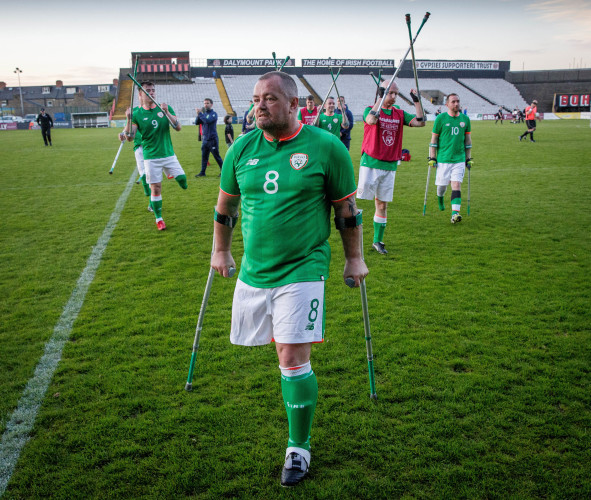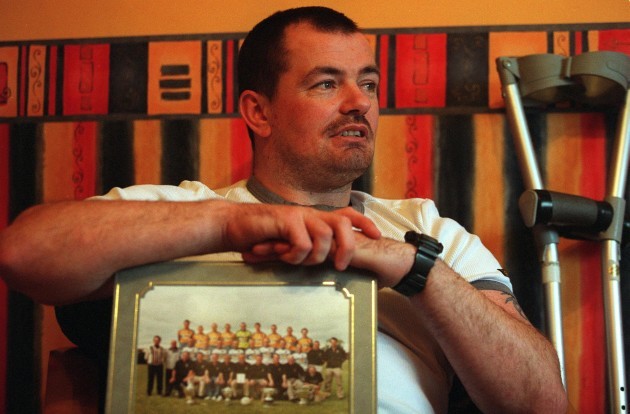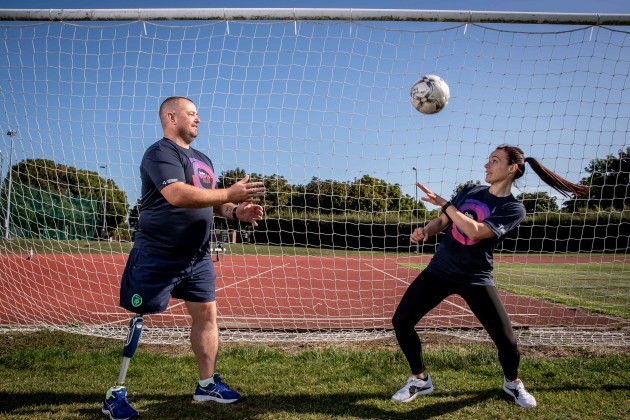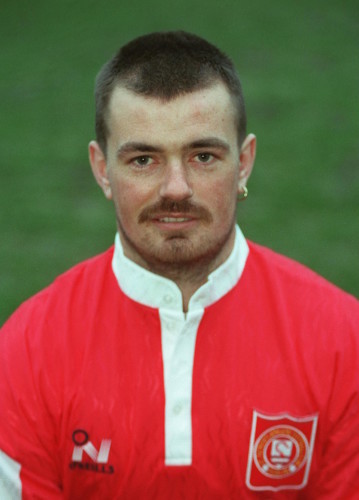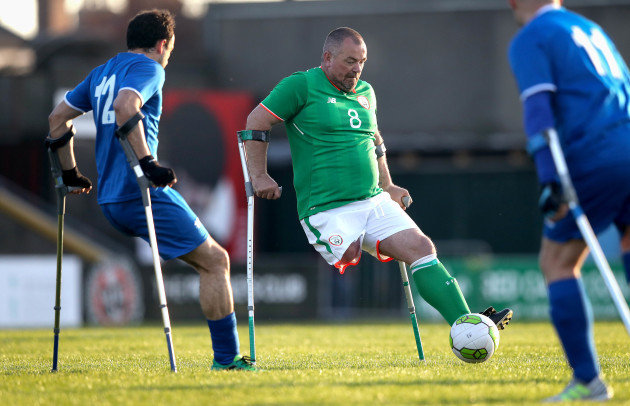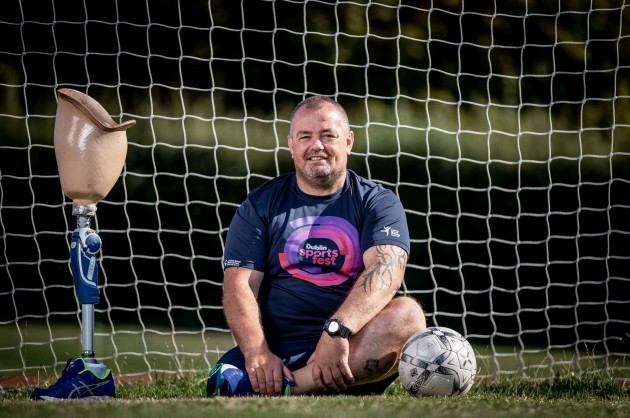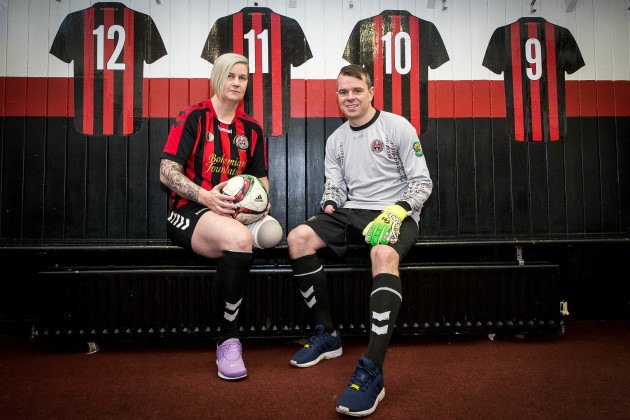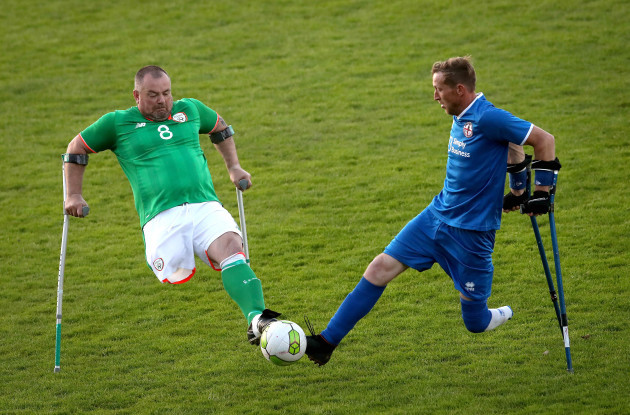IT ALL HAPPENED in the blink of an eye, but Christy McElligott can still remember with precise and exact detail the day that would change his life forever.
“I was heading to Wexford about four in the morning,” he recalls. “An articulated truck came round the bend, jack-knifed, lost control and hit the truck I was travelling to work in. Head on. Took my leg clean off.
“It was grand at the time. I say ‘grand’, but by that I mean I didn’t feel any pain. The leg was completely severed off me below the knee. I remember I had a pair of these Adidas button-upped tracksuit bottoms and they came flying off too. I was left in my boxers.”
He pauses for a moment, smiling. “I actually found it funny when I thought about it afterwards: I was embarrassed that I was just left in a pair of boxer shorts.
I tried to get out through the passenger door, but it was wedged against the side of a ditch. So I had to kick the windscreen of my truck out with my left leg and throw myself out onto the ground. The two trucks were on fire at the time, so I had to crawl along the ground on my backside, crawl backwards to safety.
“I got up once or twice to try and hop; I hopped two or three feet and went down on the ground again, because I was exhausted. I felt exhausted, but that was because I was losing so much blood.”
The summer of 2001 was drawing to a close and McElligott had just six weeks beforehand reached the pinnacle of his career. It was that rare, blissful moment in a footballer’s life when sporting excellence, magnificent achievement and local pride all came together into one.
He was 30-years-old at the time and with a successful League of Ireland career under his belt, one which included a Premier Division title with St Patrick’s Athletic in 1996 under Brian Kerr, an FAI Cup runners’-up medal the same season and having also become Monaghan United’s most expensive-ever signing.
Actually starting out his footballing career as a highly-talented young goalkeeper before later making his name as a striker, he was even offered the opportunity to go on trial with Manchester United in the late 1980s during his teens.
After his two-year spell at Monaghan at the end of the nineties, though, he returned to his local side to see out the twilight years of his career. The place where it all began — Ballymun United. Winning the FAI Junior Cup in 2001 was the absolute peak, he says.
Having proudly grown up in the flats, bringing that trophy back to share with his neighbours, his family and his friends, meant more than any other piece of silverware ever could. It might be difficult to understand placing so much emphasis on an amateur title, but it was true. It was truly, truly special.
It might have been just an FAI Junior Cup to those on the outside, but to those who did recognise its significance, it represented the culmination of years of hard work, a tight-knit community coming together, and a bond between local lads who had grown up through good times and bad prevailing, succeeding, winning together side-by-side as brothers.
The entire area rallied around the team on their journey to the final at Tolka Park in 2001. Supporters adopted David Gray’s hit song ‘Babylon’ (substituting in the lyric Ballymun instead) as their anthem and would even enjoy an open-top bus tour in the summer sunshine to celebrate afterwards.
McElligott, striker and skipper, captained Ballymun to their 3-0 victory against St Kevin’s — that Junior Cup being the fourth title his side won in a magnificent quadruple year where the north Dublin club enjoyed a historic clean sweep.
But less than two months after that crowning moment of joy and euphoria achieved with the friends he had grown up with all those years ago, the former League of Ireland star’s life was turned upside down in an instant.
“Somebody crashed their car into the back of the chap’s truck who had hit me,” he says, picking up the story. “That person must have saw me lying on the ground after I crawled out of my lorry and they rang the ambulance.
“This stranger, I can’t remember if it was a man or a woman, came down and lifted me up under the arms and tried to carry me back to safety. But they put me back down and got sick everywhere because of the sight of my right leg.
“Every time they tried to pull me backwards the flames from the two trucks were coming with them. It was a scary time and I always remember thinking to myself: ‘please don’t let me die in the countryside all on my own’. I thought I was going to die, but in a weird way it was kind of peaceful. There was no pain at all with my leg, I just got more and more tired and felt like I wanted to go asleep.”
“It felt like a couple of seconds,” he says, before snapping his fingers suddenly. “Then there were these luminous green jackets around me — the ambulance people. They put me in the back of the ambulance and drove me to Limerick.
They brought me to the hospital,” he continues, “stabilised me, sent me to Waterford Regional, and my family came down.
“Before they operated — the doctors had to cut above the knee because bacteria was after getting into the area and infected it — they gave me a consent form. I remember my mam standing beside me, saying there was no other alternative, that they would have to take the leg.
“I remember saying: ‘just give me the consent form!’, to let me sign it quick. I was still conscious and was still aware of my surroundings, so rather than my mam signing it I said ‘give it to me’. I signed the form and that was it. I went into theatre, they took above the knee and I spent 12 or 13 days in Waterford Regional recovering.”
This August will mark eighteen years since the truck crash which sent Christy McElligott’s life on a completely different course. It was immensely traumatic, he says, changing his life in a multitude of ways in terms of his family life, his work as a truck driver, and causing him to turn away from football in almost every capacity; playing, watching, everything, for a number of years.
This was one of the hardest aspects of the struggle, he admits, that sense of his identity tied hand-in-hand with sport being lost. It was who he was. “Ask anyone,” he says. “If you asked anybody about Christy McElligott, it was always about football. Christy the footballer. It was difficult and I lost my love of football.
I didn’t want to be around it because I started to see people take advantage of what they had, the opportunities that they had. Those first few years after the accident gave me a lot of time to think about everything, and maybe to overthink it. I started piling on the weight and was starting to get very depressed in how I looked, in my appearance and not wanting to do anything.”
But what defines his journey is an inspirational desire and an internal motivation to not give up. To find a different way to express oneself and not to accept limitations or be defined by them.
Coming face-to-face with death and choosing to, quite literally, fight to preserve his life gave him an entirely new perspective. In the immediate aftermath of the crash, McElligott discovered a new courage and toughness, kicking through the glass of his truck’s windshield and clawing to safety with what strength he had left.
“I don’t know what happened with me kicking in the window,” he says. “It was just instinct. I just wanted to get out. I think that’s what it was, the adrenaline inside me. I was the fittest I ever was at that time. I was playing with the AUL team, I was playing with the Ireland Junior international team as well, I was playing with Ballymun United and I was also playing gaelic on a Saturday too.
“I actually did think I was going to die. The funny thing is, it really does take you back and helps you put life into perspective. I was sitting there on the ground in the middle of nowhere and it was so peaceful. There was no pain whatsoever and I could’ve easily just dozed off, fell asleep and never woke up again. There was no fear, no nothing.
So, for me, it was really peaceful and really easy for me to do it, if I could [fall asleep]. But again, it was the response of the emergency services to get there as quick as they did and to keep me alive and still awake in the back of the ambulance going from one place to another. I went from Tullow all the way to Limerick and managed to stay awake the whole way there.
“It puts things into perspective. Afterwards I was thinking ‘Jesus, the amount of time I gave to football, and was it really that important?’ I used to eat, sleep, drink football. I never used to drink and never even smoked. Even when the lads would go out for a few beers after games, I was there sipping blackcurrant.
“I committed everything to football and then it was just gone. Looking back on it, the amount of sacrifices you make and things you give up for football… the rewards are definitely worth it, but when it’s gone like that,” he snaps his fingers again. “You’re saying to yourself: ‘God, I could’ve done so much more with the time I had, when I had it’. I think I did feel like I was being robbed of something, definitely.
“But I put it down to the fact that the decision was made for me. I didn’t have the opportunity to make that decision, somebody or something else made it for me. I kept saying to myself: ‘just be happy that you’re alive’. There was no point in dwelling on what happened, it was important to look forward.”
Fast forward nearly two decades on from the accident and McElligott has completely reinvented himself and has long since found a new lease of life. One of the most decorated amputee footballers in this country, the 49-year-old helped found the Irish Amputee Football Association seven years ago and is now also manager of Ireland’s international amputee team.
He has travelled across the world representing Ireland on the international stage, has won league and cup titles, individual awards for his service too. He went to the 2017 Amputee European Championships in Turkey and just a few months ago helped Ireland to 13th place at the 2018 Amputee World Cup which was held in Mexico. He also took part in RTÉ’s Operation Transformation two years ago, too.
More than all of this though, having worked for the last number of years in the FAI’s Football For All Programme (firstly as a volunteer and now as a full-time employee helping people with disabilities) the Dubliner has fought to give other amputee footballers a voice, the opportunity and the platform to play at the highest competitive level possible.
Last year saw the first ever season of the Irish Amputee National League take place, with 2019 seeing the competition go from strength-to-strength in its second year. Currently there are three teams competing: Shamrock Rovers, Cork City and Bohemians. The Leesiders were crowned debut champions last year and this month travel to Georgia to take part in the first-ever Amputee Champions League.
As coordinator of the league, McElligott says there are plans to see as many as six teams north and south of the border compete, in order to give as many amputee players across the entire country the chance to play football and be recognised as the top-level athletes they are.
Playing five-a-side matches every three weeks, footballers in the Irish Amputee National League play on crutches without prosthetics. The feedback since last year’s debut campaign has been overwhelmingly positive, McElligott says. It is an outlet that allows players to discover, or rediscover, a love of football, taking ownership of their experience.
The players love it,” he smiles. “The players themselves really enjoy competitive football. But they also enjoy the bond and camaraderie that it creates. We get away with slagging each other off, because we’re all amputees.
“We’ve all gone through similar experiences, so we get away with saying these things to each other. But outside of it, if somebody was to say something to one of us, we’d really flip. We believe that we’re taking ownership of who we are.
AMPUTEE FOOTBALL | The Irish Amputee National League returns this Saturday, where we will be aiming to defend the title that we won last year.
— Cork City FC (@CorkCityFC) February 21, 2019
We face @bfcdublin at 2PM and @ShamrockRovers at 2:40PM, with both games being played at Ballymun FC.
Best of luck lads! #CCFC84 pic.twitter.com/9xj7P87bXO
“We’ve been lucky to have a great group of players who all want to play football. These players want to be considered as athletes and we don’t go into the dressing room and talk about our problems. It’s not one of those cases where I want to know what happened to someone else. I want to know if you can play football, that’s all that matters.
We founded the Irish Amputee Football Association seven years ago,” he explains. “We started the international team first and it came under the umbrella of the FAI’s Football For All Programme.
“We had two or three years of training and playing games. We played against Italy, against France, Poland, England. Gradually we started to move up the ladder and then after the Euros in 2017, it was always a decision to set up our own league.
“Now every three weeks Shamrock Rovers, Cork City and Bohemians play at Roadstone, Ballymun and down in Cork too. Each team has about 10 players signed. We’ve been gifted with a huge amount of arm amputees, who can only be goalkeepers.
“The outfield players have to play on crutches on one leg. We don’t play using the prosthetic. In England they do, but we don’t, because we see it as a health and safety risk.
“A new team has just started up in Belfast. Down the line, going to plan, they will come in and play in the Irish Amputee League, meaning it could potentially be the first All-Ireland league. There is a possibility of a Limerick side coming in next year, too. If we can get to five or six teams in the next few years, that would be brilliant.
“Unfortunately we don’t have a lot of wars in this country,” McElligott jokes, addressing the player pool for amputee football in Ireland. “We don’t have landmines that people are stepping on and stuff like that — unlike in other countries in Europe and across the world.
Most of the Irish amputee footballers in this country are either born with a congenital defect or have lost it through trauma, like an accident. But all they want to do is play football.”
Currently completing his Uefa A licence, constantly striving to expand the national league, managing the Irish international team and also making time to still compete as a striker for Shamrock Rovers, McElligot’s life is busy, but he says he wouldn’t have it any other way.
You just don’t know where life will take you, he admits. So much of his life has revolved around football and even the day which changed his life forever in August 2001 was brought about because he wanted to play a friendly game for Ballymun.
Then captain, having led the side to the FAI Junior Cup just six weeks beforehand, McElligott didn’t want to miss out on a pre-season friendly game and chose to start his truck shift earlier in the morning, so he could make it back in time for the match.
Had he decided to skip the friendly, life would have been very different, he says. But he is resolute that he would not change his experience if given the opportunity. That lorry crash, a horrific and traumatic experience for anyone to go through, has made him the man he is today.
I wouldn’t change it for one second because becoming an amputee has opened so many doors for me,” he states. “Doors that wouldn’t have been an avenue I would have investigated at any other stage have opened for me because of what happened.
“I always put it back to having no regrets. You can always beat yourself up saying: ‘remember that time you didn’t take the opportunity to go on trial with Man United’, ‘remember that time you didn’t have a rest for that friendly game for Ballymun the morning the accident happened’, ‘remember that time you…,” he pauses.
“I remember all those situations in my life. For me, it’s just about trying to enjoy every minute of time I have. To try and be the best coach I possibly can, to help people understand football, to try and give them the opportunity to play. And hopefully help others get as much enjoyment out of football as I have done and still do to this day.”
Subscribe to our new podcast, The42 Rugby Weekly, here:
